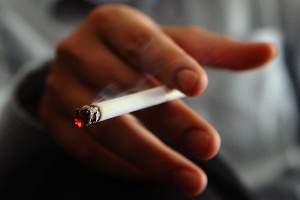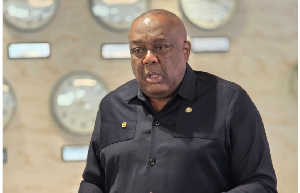Dr Akwasi Kyei-Faried, Deputy Director, Disease Control and Prevention Department of the Ghana Health Service, has disclosed that tobacco claims a life every six seconds.
He said tobacco smoke has been identified to contain more than 4,000 chemicals and that non-communicable diseases are major killers, describing the situation as “dangerous.”
Dr Kyei-Faried made this known at the joint launch of the World No Tobacco Day, 2014 and the Network of African Science Academies (NASA) Report on “Preventing Tobacco Epidemic in Africa” over the weekend at the Stepri Hall in Accra. The Day was on the theme: “Raise Taxes on Tobacco.”
Dr Kyei-Faried said tobacco causes cancers, heart disease, chronic lung diseases, eye problems, hearing loss, bone problems, stomach ulcer, infertility and child bearing complications and also kills half of its users.
Suggesting the way forward, Dr Kyei-Faried called for the reviewing of the current tax regime to make it more effective, identify better ways of checking illicit trade in tobacco, the studying of the free-zone Act, its operation and contribution.
The Director appealed to government to implement the Framework Convention on Tobacco Control (FCTC) to the fullest to protect the present and future generations from the devastating health, social, environmental and economic consequences of tobacco consumption and its exposure.
Professor Francis K.A. Allotey, President of the Ghana Academy of Arts and Sciences in a remark said the NASA Report was a culmination of work which started in April 2013 with funding from the Campaign for Tobacco Free Kids of the United States.
The Network of African Science Academies comprised Ghana, Nigeria, Uganda, Senegal, Kenya, Cameroun, Ethiopia, and South Africa, which convened a committee of experts to discuss the evidence, obstacles and opportunities from implementing and enforcing tobacco use prevention and control policies in Africa.
He said the report outlined strategies that should place tobacco control policy on the African leadership agenda, and called on civil society groups to share in the responsibility of protecting the most vulnerable, who are misled with deceitful messages by the tobacco industry.
Prof Allotey said: “I am particularly delighted that, in line with this year’s World No Tobacco Day theme, the report among other recommendations called on African governments to adopt effective use of taxation measures, including reform of tax structures, if necessary, as well as regular tax increases that in turn raises the price of tobacco products, thereby reducing demand among the youth, the poor and the vulnerable.
“I am optimistic that our government will act swiftly and decisively on the recommendations to avert a tobacco use epidemic before it occurs.”
Ms Hanny Sherry Ayittey, Minister of Health in a keynote address, noted that, the increase in the price of tobacco through higher taxes is the single most effective way to reduce consumption and encouraged tobacco users to quit.
She said Ghana’s tobacco taxation was the highest in the ECOWAS sub-region, but unfortunately the prices of cigarette remain reasonably low, making the tobacco industry to maintain control over the sale prices, thus rendering the taxation ineffective.
Ms Ayittey said to use taxation to effectively reduce demand for tobacco, Ghana would need to consider replacing the ad valorem taxation with a specific tax in the form of “an excise stamp indexed on inflation, and affixed to each ready-for-consumption packet. This will increase cigarette selling price, improve traceability and better contain smuggling.”
“It is also important to take a second look at the Free-zone Act to ensure that all tobacco products are subjected to a single Customs duty rate with a minimum CIF value and to remove Customs duty exemptions on tobacco products regardless of origin,” she said.
The Minister said a tobacco cessation Guidelines was under preparation in the Ministry and would soon be finalized with the support of World Health Organisation to be used by the trained regional and mental hospital teams.
She said about 90 per cent of work on the legislative Instrument on the Public Health Act has been done and that it has been submitted to the Attorney General’s Department for final fine-turning.
She said the Food and Drug Authority would step up its regulatory role and introduce pictorial health warnings on cigarette packs this year and: “I belief that, all stakeholders will continue to play their respective roles to ensure a tobacco-free Ghana.”
Mr Labram M. Musah, Programme Director, Vision for Alternative Development (VALD), a non-governmental organization took the audience through the Section Six of the key 13 elements of the (Tobacco Control Measures in Ghana) of the Public Health Act (Act 851).
He said the Act gives legal backing to the banning of tobacco use in public places, advertising and sale among others, and advised students to propagate the message wherever they go.
Health News of Tuesday, 3 June 2014
Source: GNA













